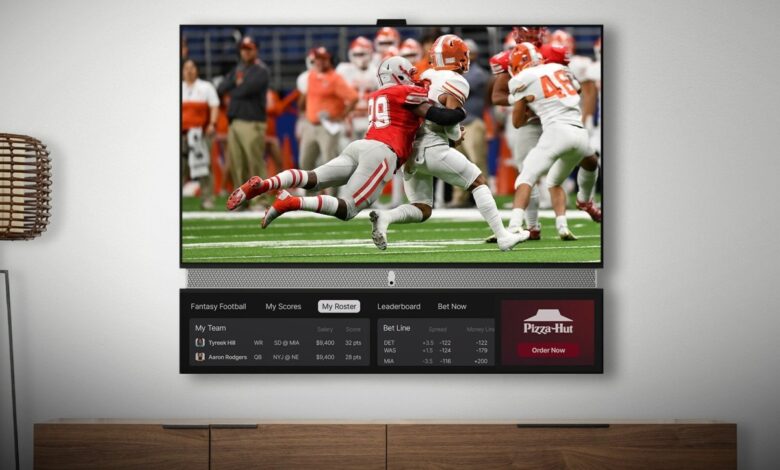Telly, the ‘free’ sensible TV with adverts, has privateness coverage purple flags

[ad_1]
Yesterday, we checked out a brand new {hardware} startup referred to as Telly that’s making a gift of half 1,000,000 of its new sensible televisions at no cost. The catch is that the 55-inch sensible tv is fitted with a second show that sits beneath and shows adverts whilst you watch your favourite exhibits.
The trade-off for a free tv is agreeing to let this model new startup accumulate huge quantities of information about you as a result of the cash adverts make from you cowl the prices of the tv itself.
In keeping with its privateness coverage, the startup collects knowledge about what you view, the place you’re situated, what you watch, in addition to what could possibly be inferred about you from that info.
However annotations left in its privateness coverage that have been printed in error elevate issues about its knowledge practices. As first famous by journalist Shoshana Wodinsky:
We’ve pasted under the portion of Telly’s privacy policy verbatim, typos included, because it was printed on the time — and have highlighted the questionable passage in daring for emphasis:
“As famous within the Phrases of Use, we don’t knowingly accumulate or solicitPersonal Knowledge about youngsters beneath 13 years of age; ifyou are a baby beneath the age of 13, please don’t try to register for orotherwise use the Companies or ship us any Private Knowledge. Use of the Servicesmay seize the bodily presence of a kid beneath the age of 13, however noPersonal Knowledge concerning the youngster is collected. If we study we now have collectedPersonal Knowledge from a baby beneath 13 years of age, we are going to delete thatinformation as shortly as attainable. (I don’t know that that is correct. Do wehave to say we are going to delete the knowledge or is there one other manner aroundthis)? In the event you consider {that a} youngster beneath 13 years of age could have providedPersonal Knowledge to us, please contact us at…”
A short while after contacting Telly for remark, the corporate eliminated the part from its privateness coverage.
In an electronic mail, Telly chief technique officer Dallas Lawrence stated an outdated draft of the privateness coverage was uploaded by mistake.
“The questions raised within the doc between our developer workforce and our privateness authorized counsel seem a bit out of context. The problem raised was a two-part technical query associated to timing and whether or not or not it was even attainable for us to be in possession of this type of knowledge,” Lawrence stated. “The workforce was unclear about how a lot time we needed to delete any knowledge we could inadvertently seize on youngsters beneath 13. The time period ‘shortly as attainable’ that was included within the draft language appeared obscure and undetermined and needing [sic] additional clarification from a technical perspective.”
Lawrence stated its builders didn’t consider it’s attainable to seize private knowledge on youngsters beneath 13, including that minors are “not allowed to register” with Telly.
It’s not the one purple flag within the coverage itself. In keeping with the coverage, a few of the knowledge it collects is delicate, like exact geolocation. The tv additionally collects names, electronic mail addresses, cellphone numbers, ages and dates of delivery, zip codes, gender and ethnicity, and “intercourse life or sexual orientation.”
The startup says it additionally collects your “cultural or social identifiers,” akin to what sports activities workforce you may like (“a Inexperienced Bay Packers fan”), what bodily actions you take pleasure in (like “being a skateboarder”), but in addition issues like if you happen to’re “an environmental activist,” the coverage states.
Whereas it may not be shocking {that a} free, ad-supported product is gathering huge quantities of details about its customers, there are risks in gathering this knowledge to start with.
Advert networks accumulate gobs of data from varied sources — web sites, cellphone apps, and ad-supported {hardware} — to construct up profiles about customers that can be utilized for focused promoting. The extra that advert networks accumulate, the extra they’ll infer about you, and the extra they suppose they’ll precisely serve you adverts that you just’re prone to click on on and make them cash.
As soon as knowledge is collected, adverts knowledge is shared and bought by knowledge brokers, who then promote it on to different firms and companies for something from fraud prevention to enabling surveillance. Knowledge brokers additionally promote adverts knowledge to legislation enforcement companies, which may purchase the info as an alternative of acquiring a warrant. The FTC lately accused knowledge dealer Kochava of promoting geolocation knowledge on “a whole lot of tens of millions” of cellular gadgets, which could possibly be used to trace the actions of people to delicate places, like abortion clinics and locations of worship.
Good TVs are infamous knowledge collectors. Years in the past, Vizio televisions have been caught spying on buyer viewing habits and later ordered to supply clients a strategy to opt-out of the monitoring. Different sensible TV makers aren’t a lot totally different: Samsung collects details about what customers watch on its sensible televisions, knowledge that was subsequently stolen in an information breach final yr.
Particularly with {hardware}, there isn’t any such factor as free. In the event you don’t need your tv telling the world what you watch and why, maybe Telly isn’t for you.
[ad_2]
Source link




